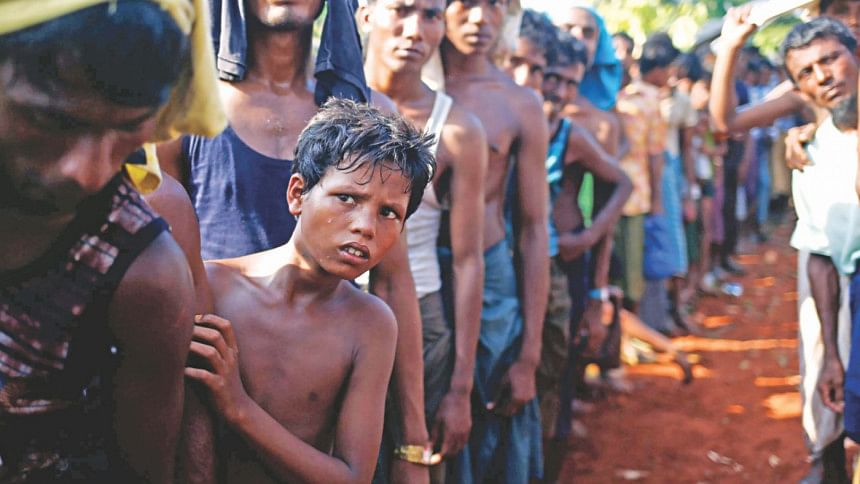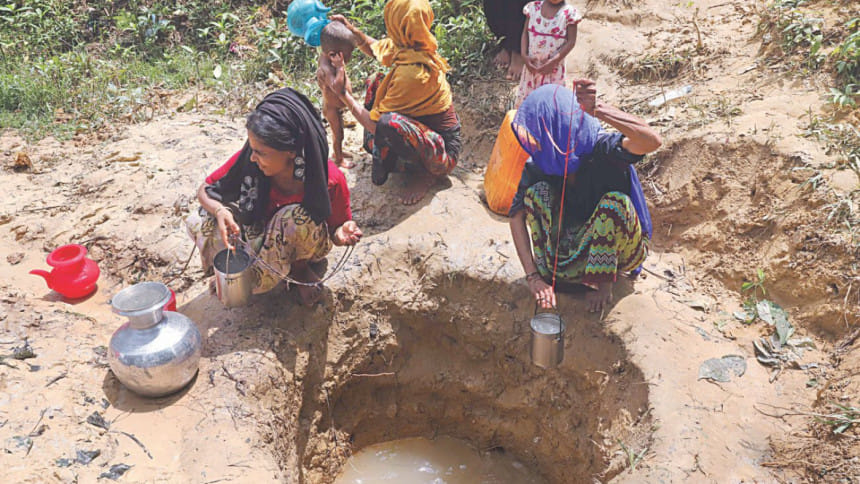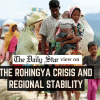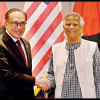Water, Sanitation Crisis: Roadside refugees suffer the brunt

Tens of thousands of Rohingyas, who are staying either in the open or in makeshift tents by the Cox's Bazar-Teknaf highway, hardly have any drinking water and sanitation facilities.
The refugees, mostly children and women, also can't take a bath as there is no arrangement for that. Also, there are only a handful of makeshift latrines. As a result, almost all of them need to go to nearby jungles to defecate.
In this situation, the Myanmar nationals, especially the children, are falling sick every day.
Visiting more than 20 of the makeshift tents which mushroom along the highway from Leda in Teknaf to Kutupalong in Ukhia -- a 42-kilometre distance -- these correspondents saw at least one sick child in each tent. Some of them had more than one.
No one could exactly say how many of the refugees living in the tents are children and women. However, more than 400,000 Rohingyas have fled to Bangladesh since violence erupted in Rakhine on August 25 and the Unicef says over 80 percent of them are women and children.
According to the local administration, some 1.1 lakh Rohingyas were staying either in the open or in the roadside tents failing to get a place in the overcrowded Rohingya camps.
Among them, the mothers who are giving birth to babies and children who are suffering from various diseases are the worst sufferers.
Take the example of Zobaida Begum, a pregnant Rohingya woman who gave birth to a baby girl inside a 10-feet-by-10-feet tent on Thursday night.
As these correspondents went inside the tent, her husband Mohammad Elias along with some women appeared and said they came to that place a week ago from Shilkhali, Rathidaung in Myanmar.
"Suddenly last night, she [Zobaida] had labour pain. With the help of some other women the mother gave birth to the child," said a lady from a nearby tent.
The woman then pointed to another tent and said a baby was born the same way in the same unhygienic condition in that tent four days ago.
There were similar tents as far as the eye could see. Ten to 12 people were staying in each.
"You go to any tent, you will find at least one sick kid," said Nur Bahar, a Rohingya woman. "We have no other facilities here. We don't know any other place."
Shafiqa, who came from Bhuthidaung township, said two of her four sons were suffering from fever for the last four days. They were lying in their tent and they had no medicines.
Fatima, another woman, said her daughter was having diarrhoea and fever for the last few days.
Asked, Nur Bahar said she took a bath for the first time in 15 days yesterday.
"I went to the old Kutupalong camp for a shower today. I was lucky to have a chance for it," she said.

Cleaning the roadside forest and cutting hills, newly arriving Rohingyas have set up slums along the highways. But there is hardly any drinking water for them.
Some NGOs were coming with water lorries, but it was very insufficient in comparison with the huge number of people.
Asked about the sanitation issue, Sanjida Begum, a woman who was cleaning her clothes in a canal near the Balukhali camp, said, "There is no arrangement for taking bath and using latrines. We have to go to the jungle at night.
"We got some food as relief. We can drink from this canal as well. But we can't clean ourselves with this dirty water. Me and my five daughters haven't taken a bath in the last five days," she said.
All the women and the children in the area were facing the same problem.
People traveling to that place could easily get a stench of human excreta. CNG-run auto-rickshaw driver Ramjan Ali said the place was not like that even a week ago.
NGO workers said they were facing the problem while working in those areas.
Rezaul Karim Chowdhury, executive director of Coast Trust, an NGO, said, the government should take immediate steps to arrange drinking water and ensure sanitation for the people.
"Otherwise it would be a big humanitarian crisis," he said.
Contacted, Md Ali Hossain, deputy commissioner of Cox's Bazar, said a huge number of refugees had arrived within a very short time.
"It is almost impossible to ensure all the facilities for everyone so quickly. But we are trying our best to solve the problem. Hopefully, things will be okay in a day or two," he said.
VACCINATION CAMPAIGN
Meanwhile, a rubella and polio vaccination campaign for 1.5 lakh children of Rohingya refugees started in Ukhia and Teknaf upazilas yesterday morning.
All the children, aged between six months and 15 years, would be vaccinated for rubella (measles), Cox's Bazar Civil Surgeon Dr Abdus Salam told The Daily Star over phone.
Children below five years would be administered polio vaccines while six-month-old to five-year-old children would be provided vitamin A capsules, he said.
"Most of the children of the Rohingyas are either not vaccinated or poorly vaccinated. So, we decided to conduct the vaccination," he said.
"We have found four children suffering from rubella," Salam said.
"We have already got all the necessary supplies from the government and non-government agencies, and mobilised additional health personnel from neighbouring upazilas to conduct the vaccination campaign," he added.
He said they would be able to vaccinate the targeted children in seven to 10 days.

 For all latest news, follow The Daily Star's Google News channel.
For all latest news, follow The Daily Star's Google News channel. 








Comments